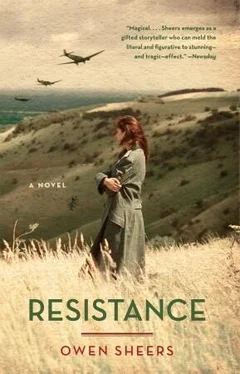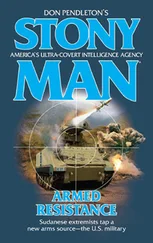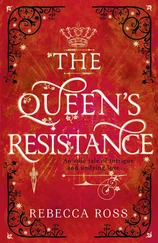Although she vaguely remembered the brush strokes of these stories, she read them as if for the first time. The night after she read of Henchard selling his wife in The Mayor of Casterbridge , she dreamt that Tom was selling her at the market. A crowd of German soldiers were raising their hands and nodding in response to the auctioneer’s rhythmical chant. She’d woken in a cold sweat to find the tether at her neck was just the sheet wrapped about her throat, but the anger she’d dreamt was real, still burning in her chest and flushing over her cheeks.
It was a bleak Christmas. In the absence of Reverend Davies, on Christmas morning the women met at Maggie’s, where Mary read to them from the Gospels of Matthew and Luke, giving special emphasis to the angel’s visit to the shepherds and glancing at Maggie when she read. “Then was Jesus led up of the Spirit into the wilderness to be tempted by the devil.” They sang carols around the fire and Maggie uncorked the stone flagons of last year’s cider that William kept under the pig-killing bench in their larder. Edith didn’t speak much, Christmas always being when her talking turned more to Roderick than those who were with her, but she sang the loudest, asking for “the Bread of Heaven” so strong and sure that it made Mary shake her head and Bethan laugh out loud. Mary had brought some wheat wine, and for the first year, despite her giggling at Edith, she let Bethan take a glass. Maggie gave them all a small wrapped parcel of cheese she’d made that week, and for Menna’s two children some of her own boys’ soft toys that she’d kept all these years.
Sarah found herself often looking out of Maggie’s front window, just as she had on that first morning after the men’s going. Again, she half expected to see the Germans coming into the yard, but this time in the way the poet’s Germans had come over the trenches into no-man’s-land on Christmas day 1914; offering presents, cigarettes, and company rather than occupation and fear. But they never came. The week before, Gernot and Steiner had called at all their houses to give them wreaths they’d made from holly, evergreen leaves, and long strands of ivy. Only Maggie and Menna had hung them on their doors, but now Sarah wished she had too. Somehow she’d thought she’d see them on this morning, and somehow, it being Christmas, that it would have been all right when she did. But they stayed away and for Christmas Day the valley remained another kind of no-man’s-land, vacated of their husbands and filled with nothing but the ghosts of their memories haunting the lanes, fields, and beds they’d once shared with their wives.
The winter clung on, stubborn and freezing into the new year. For all of them, the women and the patrol, the silence it brought was the worst. Not the silence of the valley itself, of the stilled brook, of an empty field under heavy snow, but the silence of beyond the valley, the silence of the rest of the world.
By this stage of the war, Albrecht, Alex, and Sebald had no one left to write to, but for the younger three soldiers this was not the case. For Otto it was his mother in Hamburg, for Steiner and Gernot their parents, school friends, and sweethearts back home. No army postal service could have reached them in the valley, even if they’d known they were there, and it was futile trying to free the staff car or the motorbike to ride into any of the surrounding towns. So they lived on, deprived of the distant voices that had, at irregular intervals, kept them connected with their homes.
For the women too there had been no mail since a week or so after the invasion. Mary had family over the hill down in Hay-on-Wye, Menna a sister and cousins in the mining valleys, and all of them except Sarah had brothers, sons, uncles in the war. But there was no word from any of them, and every morning they woke to nothing more than the snow’s blank page, written across with a filigree of bird prints, a daily reminder of the letters that remained unwritten and unsent from the world beyond.
Apart from the occasional red glow in the night sky from the steelworks over in the mining valleys (working for whom, the British government or the Germans, they didn’t know), the patrol’s radio remained the valley’s only connection with the rest of the country. Despite the difficulty of climbing through the snow, Albrecht and Steiner kept up regular walks to higher ground, searching for a signal and the news transmissions that would tell them how the war was turning without them.
In this way Albrecht witnessed the gradual ending of the war; the violence, the disruption of the conflict that had shaped their lives for the last five years translated into a montage of reports, speeches, and announcements, all played out against the silence and stillness of the winter mountains. When the German announcer read out the impossibly large figures of sunk merchant ships, Albrecht was studying a striking red moss he’d uncovered with the toe of his boot. When the fainter voice of the BBC condemned the cowardly onslaught of V1 and V2 rockets upon London, he was holding a kestrel’s frozen feather in the palm of his hand, staring intently into its intricate frosted structure. When, two weeks later, the German service described how Nelson’s Column had been sliced in two and tipped onto the loading platforms of a transport lorry to be taken as a trophy back to Berlin, Albrecht was watching the intimate torture of an insect, impaled by a shrike on the thorns of a nearby bush. And when he listened, two weeks later again, to the description of the Führer’s surprise visit to London, he had, once more, been slipping fragile sheaths of ice from the blades of coarse grass at his feet. He let the ice melt in his hand as he listened to the announcer describe how Hitler had stood on Parliament Hill promising “to bring peace at last to this nation, misguided for so long by the corrupt democracy that once sat in those shattered buildings beneath us.”
And yet the ever fainter voice of the BBC still broadcast, hinting that perhaps the optimism of the German reports was not entirely true, that the whole country was not yet under the Nazis’ iron heel. The BBC did admit, however, that Churchill had, along with many of his Cabinet, followed King George and sailed for Canada. Despite assurances that he would die in his bunker at Neasden, armed with just a pistol and his motto, “You can always take one with you,” the Prime Minister had left these shores “to better continue the fight against the evil of fascism,” until that day when he would return “to rout the invaders from our land.”
Through it all, over those fragmented weeks of listening to the fall of London, Albrecht became acutely aware of the multitude of hinges in events that had brought about this unfolding present. Of how easily, given the alternative tipping of countless moments of chance, he could have found himself sitting on another hillside, somewhere else, listening to a parallel description of the fall of Berlin. Had Stalin not boarded his train and abandoned Moscow; had the British arctic convoys been successful in supplying what was left of the confused Russian defence; had America answered Churchill’s call sooner; had the Führer himself not overseen the resurrection of the Luftwaffe.
And even after all of these factors had played into the war’s script, still it could have been so different. What if the Allies’ attempted invasion of mainland Europe had not been delayed by bad weather? If their giant floating harbours had not listed and sunk? If their floating Shermans had made it to shore and broken the beachheads, destroying the bunkers in which he and the others had crouched. What then? Would they have rolled back the relentless Nazi advance?
One piece of information repeated within his mind more than any other. Something he’d been told by one of the few contacts he still had in Wehrmacht Intelligence. That maybe all this, a German victory, the end of the war, was down to one man. Not a general or a chief-of-staff, but a long-term sleeper agent who’d discovered the Allies’ elaborate deception plans: a massive fake army of inflatable tanks, cardboard bombers, and plywood landing craft stationed at Dover facing Calais. A dummy invasion force, complete with rows of speakers broadcasting the sound of a mobilising army across the narrowest point of the Channel. It had almost worked. The elite Panzer divisions had been ordered to remain in Calais. Thousands of crack SS and Wehrmacht troops poured into the area to await the false invasion. But then one man, who had for the past ten years gone about his business as a bank clerk in Brighton, discovered indisputable proof of the charade and broadcast the truth to Berlin just moments before the British picked up his signal and broke down the door of his bedsit.
Читать дальше












